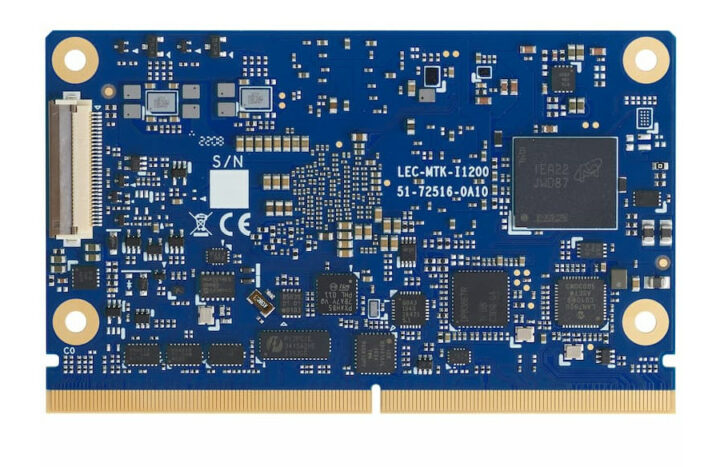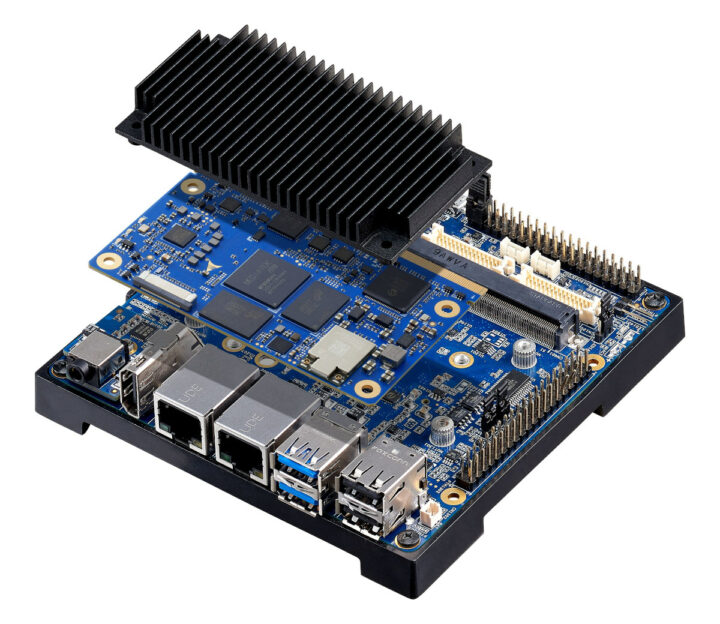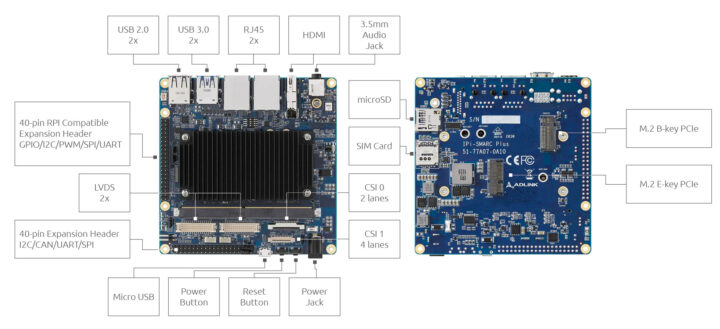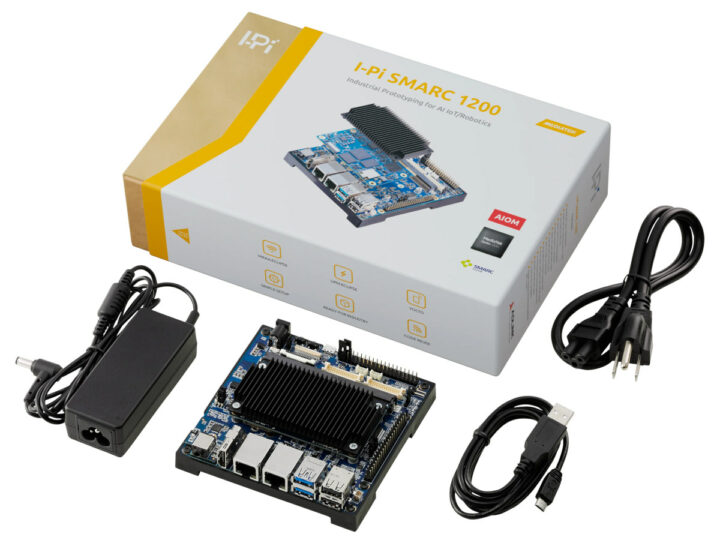ADLINK Technology’s SMARC 2.1 compliant LEC-MTK-I12000 system-on-module (SoM) features the MediaTek Genio 1200 octa-core Cortex-A78/A55 AIoT processor coupled with up to 8GB RAM and 256GB UFS storage, and powers the I-Pi SMARC 1200 development kit designed for robotics and AIoT applications.
LEC-MTK-I1200 MediaTek Genio 1200 system-on-module
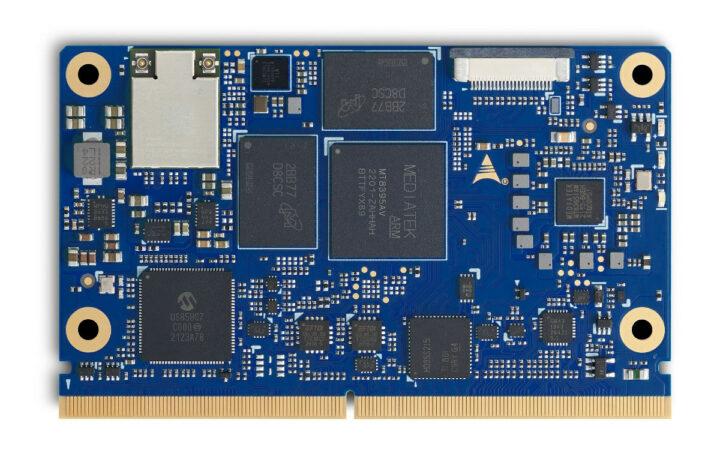 LEC-MTK-I1200 SoM specifications:
LEC-MTK-I1200 SoM specifications:
- SoC – MediaTek Genio 1200 (MT8395) octa-core processor with 4x Cortex-A78 cores @ 2.2GHz, 4x Cortex-A55 cores @ 2.0GHz with penta-core Arm Mali-G57 GPU @ 880MHz with support for OpenGL ES 3.2/2.0/1.1, Vulkan 1.1/1.0, OpenCL 2.2, 5.0 TOPS NPU, HiFi 4 audio DSP, etc…
- System Memory – 4 or 8 GB LPDDR4X
- Storage – 32, 64, 128, or 256 GB UFS storage, compatible with UFS gear 2.1
- Wireless – 802.11b/g/n/ac WiFi 5 2×2 MU-MIMO, Bluetooth 5.0
- 314-pin MXM connector with
- Storage – 1x SDIO (4-bit) compatible with SD/SDIO standard, up to version 3.0
- Display
- HDMI 2.0b up to 4Kp60
- Dual-channel LVDS
- 2x 4-lane DSI MIPI up to 4Kp60 with 24-bit RGB
- Camera I/F – 3x 4-lane MIPI CSI
- Audio – I2S for audio codec located on carrier board
- Networking – 2x Gigabit Ethernet RJ45 ports
- PCIe – 1x PCIe Gen 3 x2
- USB – 2x USB 3.0, 4x USB 2.0
- Serial – 4x UART, 1x CAN 2.0B bus up to 8Mbps
- Low-speed I/Os – 2x SPI, 4x I2C, 14x GPIO with interrupts, one with PWM
- Security – Optional Security TPM 2.0 module (optional)
- SEMA Board Controller – Voltage/Current monitoring, Power sequencing, Logistics/Forensic information, I²C bus control, GPIO control, Watchdog timer
- Debugging
- 30-pin multipurpose flat cable connector for use with optional DB-30 debug module
- JTAG, BMC access
- UART, power test points
- Diagnostic LEDs, Power, Reset, Boot configuration
- Supply voltage – 5V DC
- Dimensions – 82 x 50 mm; SMARC 2.1 form factor
- Temperature Range – Standard: 0°C to 60°C; rugged: -40°C to 85°C
- Humidity
- 5-90% RH operating, non-condensing
- 5-95% RH storage (and operating with conformal coating)
- Shock and Vibration – IEC 60068-2-64 and IEC-60068-2-27, MIL-STD-202 F, Method 213B, Table 213-I, Condition A and Method 214A, Table 214-I, Condition D
- HALT – Thermal Stress, Vibration Stress, Thermal Shock, and Combined Test
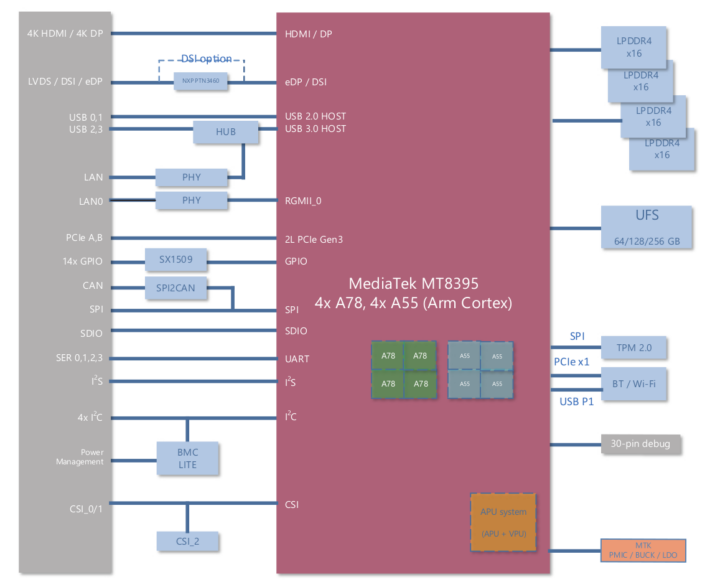
ADLINK provides support for Ubuntu and Yocto Linux for the module. It offers specifications that will be comparable to the Rockchip RK3588-based CPU module, although UFS storage is nice to have compared to eMMC 5.1 flash. The module is designed for AIoT applications with a 5.0 TOPS AI accelerator, support for up to 3 cameras, and a relatively low-power envelope suitable for robotics and drone applications.
I-Pi SMARC 1200 development kit
I-Pi SMARC 1200 development board specifications:
- SoM – LEC-MTK-I1200 SMARC module with 4GB LPDDR4x memory and 64GB UFS storage
- Storage – MicroSD card slot
- Video Output
- HDMI 2.0b port up to 4Kp60
- 2x LVDS connectors
- Camera interfaces – 2-lane MIPI CSI (CSI0) connector, 4-lane MIPI CSI (CSI1) connector
- Audio – 3.5mm audio jack, digital audio output via HDMI
- Networking
- 2x Gigabit Ethernet RJ45 ports
- Optional WiFi and Bluetooth via M.2 socket
- Optional 4G LTE and 5G cellular connectivity via M.2 socket and nanoSIM card slot.
- USB – 2x USB 3.0 ports, 2x USB 2.0 ports
- Expansion
- 40-pin Raspberry Pi-compatible GPIO header
- M.2 B-Key (PCIe) socket
- M.2 E-Key (PCIe) socket
- Debugging – Serial via MicroUSB port
- Misc – Power and Reset buttons
- Power Supply – 12V DC via power barrel jack
The kit ships with the module fitted with a heatsink, the baseboard, a micro USB cable, and a 12V DC adapter plus a power cord. More details about the module and development kit can be found on the product page and ipi.wiki website where you’ll also find details about the Yocto 4.0 such as the GitHub repo with the meta layer (currently empty) and a pre-built Yocto Linux image with Linux 5.15.
ADLINK I-Pi SMARC 1200 development kit can be purchased for $379.00 with WiFi on the i-Pi online store.
Updated: The article was initially published on June 16, 2022, and updated following the launch of the I-Pi SMARC 1200 development kit in May 2023

Jean-Luc started CNX Software in 2010 as a part-time endeavor, before quitting his job as a software engineering manager, and starting to write daily news, and reviews full time later in 2011.
Support CNX Software! Donate via cryptocurrencies, become a Patron on Patreon, or purchase goods on Amazon or Aliexpress


